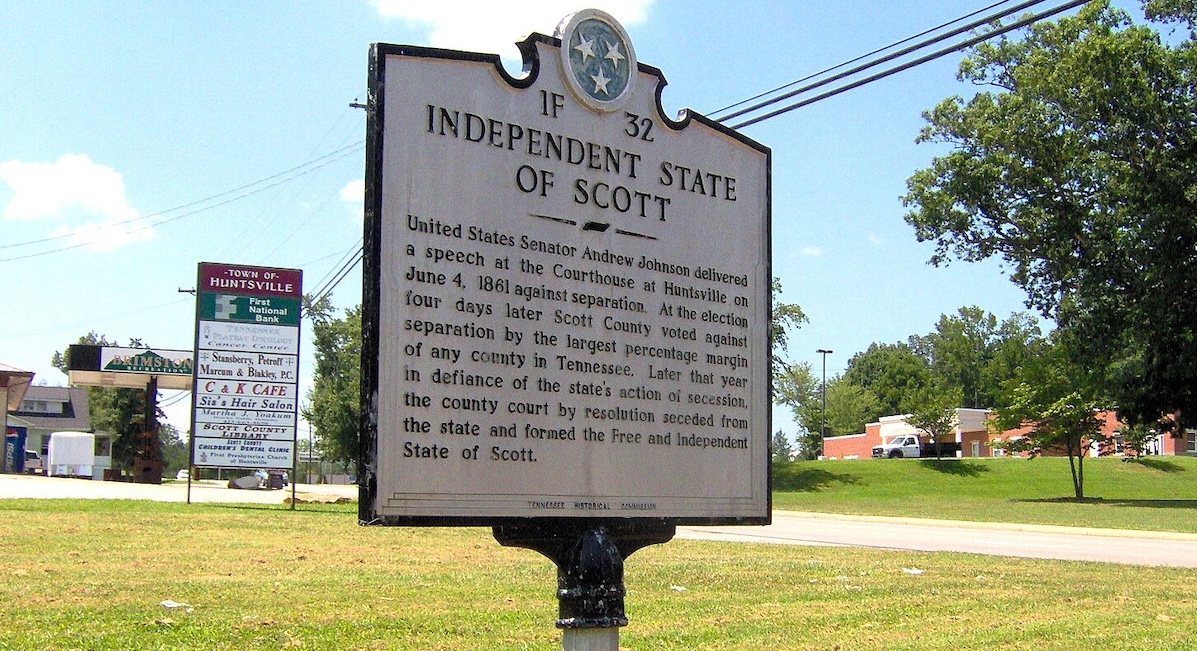First, an apology: Whatever pop culture “Scott” you’re thinking of, this is not about that person. It’s not about any person, in fact. It’s about the State of Scott – a county in Tennessee that declared itself a free and independent state when Tennessee seceded from the Union and joined the Confederacy, kicking off the Civil War.
While there’s a pretty rich history of Union safe spots in the southern states, Scott County, Tennessee might have the most interesting history among them. The short version of its backstory is that in the eastern portion of Tennessee, secession was unpopular. With very few slaves and very little sympathy toward the rich plantation owners in the rest of the state, Scott County was just not on board.
And that’s when things got fun.
On June 12, 1861, four days after Tennessee officially seceded, a popular vote in Scott County came back 541-19 against seceding. As a result of this near-unanimous vote, the Scott County General Assembly approved its own secession from Tennessee later that year. According to the book County Scott and its Mountain Folk by Esther Sharp Sanderson, a local farmer was quoted as saying, “If the goddamn State of Tennessee can secede from the Union, then Scott County can secede from the State of Tennessee.”
All things considered, that is a pretty badass quote. And it wasn’t inherently wrong – local leaders claimed that the county had just as much legal standing to secede from Tennessee as Tennessee did to secede from the USA.
Just as you surely suspected, Confederate leaders reacted calmly and rationally. Instead of just leaving this part of Tennessee alone because they all just wanted to be left alone, the governor sent 1,700 troops to go arrest and execute everyone on the county court. Ho hum.
Thankfully – for this story and for their lives – it didn’t work. There was substantial resistance from the eastern Tennesseans who were not interested in being executed for doing the same thing that the rest of Tennessee was doing. And then, doing what really became their thing, the Confederate troops surrendered.
There was a battle in Huntsville, which is the county seat, in August of 1862. The Union was pretty badly outnumbered and had to retreat out of the town, so the still-butthurt Confederates decided to loot the area and spend hours (unsuccessfully) hunting down members of the county court from the year prior. No luck.
As you surely know, the Union eventually won the war and slavery slowly got phased out. But the State of Scott remained. One could argue that the state was never formally recognized by, well, anyone, so its history isn’t overly distinguished, but it’s certainly fun. And what’s more, they kept the dream alive.
In 1986, during Tennessee’s bicentennial celebrations, the State of Scott relented. The county held a vote and the numbers came out in favor of rejoining the state of Tennessee. They passed a resolution stating that “the Free and Independent State of Scott” would be dissolved. All that’s left of its notable history today is a plaque on the side of state route 63, near the Huntsville mall, commemorating the State of Scott.
(Photo credit: Brian Stansberry)
